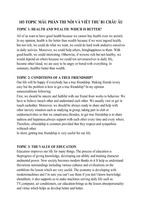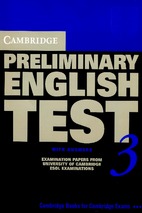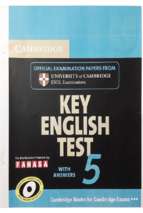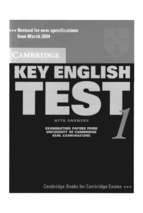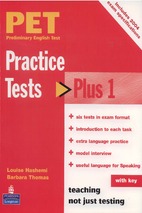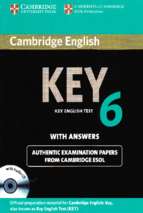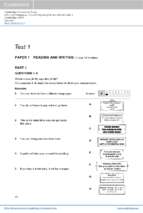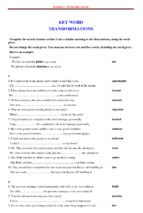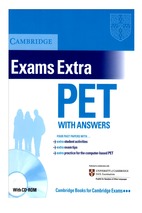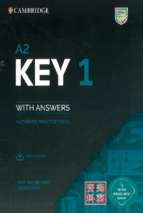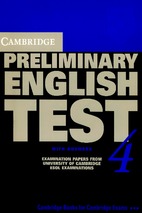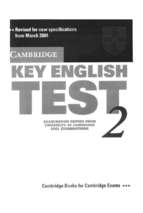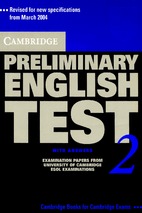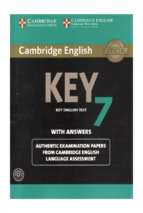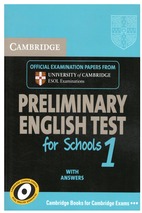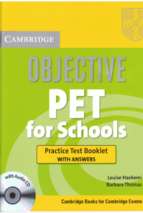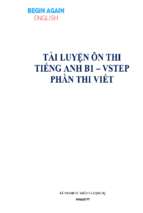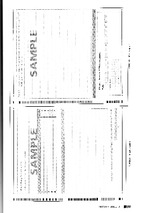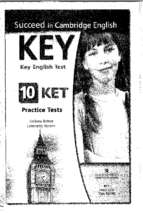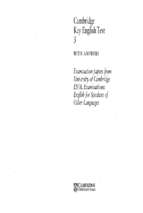CA~1BRIOGE
UNIVERSITY
PRESS
Cambridge, New York, Melbourne, Madrid, Cape Town,
Singapore, Sao Paulo, Delhi, Mexico City
Cambridge University Press
The Edinburgh Building, Cambridge CB2 8RU, UK
www.cambridge.org
Information on this title: www.cambridge.org/978052 I I 78976
0 Cambridge University Press 2009
This publication is in copyright. Subject to statutory exception
and co the provisions of relevant collective licensing agreements,
no reproduction of any pan may take place without the wrinen
permission of Cambridge University Press.
First published 2009
6th printing 2013
Printed in Poland by Opolgraf
A catalogue record for this publiauion is available from th« British library
ISBN
ISBN
ISBN
ISBN
ISBN
ISBN
ISBN
ISBN
ISBN
978-0-521-17897-6
978-0-521-74461-4
978-0-521-74466-9
978-0-521-54149-7
978-0-521-54150-3
978-0-521-54151-0
978-0-521-54152-7
978-0-521.{)1994-3
978-0-521.{)1995-0
Practice Test Booklet without answers
Practice Test Booklet with answers with Audio CD
Pack
Student's Book
Teacher's Book
Cassette Set
Audio CD Set
Workbook
Workbook with Answers
Cambridge University Press has no responsibility for the persistence or
accuracy of URLs for external or third-party internet websites referred to in
this publication, and does not guarantee that any content on such websites is,
or will remain, accurate or appropriate. Information regarding prices, travel
timetables and other factual information given in this work is correct at
the time of first printing but Cambridge University Press does not guarantee
the accuracy of such information thereafter.
Map of Objective KET Student's Book
TOPIC
EXAM SKILLS
GRAMMAR
Unit 1 Friends 8-11
1.1 Friends for ever
1.2 Borrow this!
Paper 2 Listening: Part 1
Presentsimple: be, have
Questions in the
present tense
Adjectives describing
feelings
Personal possessions
(P) The alphabet
Exam folder 1 12-13
Baper 2 Listening; Part l
Unit 2 Shopping
Paper 1: Part l (Reading)
Paper 2 Listening: Part 3
How much ?
How many ?
some and any
Shopping and shops
(P) /a:/ car, /e1/ whale,
/re/ apple
14---17
2.1 For sale
2.2 Shopping from home
Exam folder 2 18-19
Unit
3 Food
and drink
20-23
3.1 Breakfast, lunch and
dinner
3.2 Food at festivals
Paper 1: Part 6 (Writing)
Paper 2 Listening: Part 5
Paper 1: Part 4 (Reading)
Paper 1: Part 9 (Writing)
(S) Plurals
Present simple
Adverbs of frequency
Telling the time
Paper 1 Reaeal.Qng: Farts 1 and 2
Unit 10 Places and
buildings 62-65
10.l Inside the home
10.2 Famous buildings
Paper 2 Listening: Part 2
Paper 1: Part 2 (Reading)
The passive - present and
past simple
-fe
(P) Dates (years)
Raper I R:eaclingand Writing: Part 4 {Reading: Right,Wrong, Daesth sa:y)
Unit 11 Sport 68-71
Paper 1: Parts 3 and 4
Paper 2 Listening: Part 5
Paper 1: Part 6 (Writing)
11.1 Living for sport
11.2 Keeping fit
~~------~~~~~~~-"-~~~--o-
Word order in questions
Verbs in the -ingfQrm
Writing folder 3 7.:2-7:3
Paper 1 Reading anti Writing: Part 9 (Writing)
U nit 12 The family 74-77
12.l Family trees
12.2 Large and small
Paper 2 Listening: Part 3
Paper 1: Part 4 (Reading:
Right, Wrong, Doesn't say)
Possessive adjectives and
pronouns
Subject, object and
reflexive pronouns
Sport and sports
equipment
Fitness
(P) lb! basketball,
Iv I volleyball
(S) gu-, qu-
People in a family
(P) /au/ cow, /-;):/ draw
(S) Words ending in -le
Everything, something,
anything, eta.
Units 9-12 Revision 78--79
Paper 2 Listening: Part 2
Paper 1: Part 5 (Reading)
Unit 13 The weather
80--83
(Not) as ... as
Enough and too
Weather
(P) Unstressed words with
jg/
(S) to, too and two
13.l Sun, min or snow?
13.2 Too muth weather!
Exam folder 7 84-'85
P,aper 2' Listening: Part 2
Unit 14 Books and
studying 86-89
14.1 Something good to
read
14.2 Learn something new!
Paper 2 Listening: Part 4
Paper 1: Part 3 (Reading)
Exam folder 8 9~91
Raw€r I 'R€ad'ing and W11iting: Part 3 (Reacding)
Unit 15 The world of
work 92-9S
15.l Working hours
15.2 Part-time jobs
Paper 1: Part 4 (Reading:
multiple choice)
Paper 2 Listening: Part 3
,___~~~~~~~~~~~
Position of adjectives
School subjects, education
(P) Silent consonants
(S) Words that are often
confused
Work,jobs
(S) Words ending in -er
and -or
(P) lo/ clothes, 101 thirsty
Rather than
Present perfect
Just and yet
,___~-------~~~~~~~-'-~~
Writing folder 4 9&-917
Paper J Reading and W1Jiting: f'Par,t 8 (Wi;iting)
Unit 16 Transport
98-101
16.l Iourneys
16.2 A day out
Paper 3 Speaking: Part 2
Paper 2 Listening: Part 1
Modal verbs 2: must,
mustn't, don't have to,
should, need to, needn't
ld1J'tS .1-16 e\ll!JIOt1 102-103
4
MAP
OF OBJECTIVE
KET STUDENT'S
BOOK
Transport
Collocations with
transport
Directions
(P) Weak and strong forms
(S) i ore?
TOPIC
EXAM SKILLS
GRAMMAR
Unit 17 Science and
technology 104-107
17.l Techno Star
17.2 Science is great!
Paper 1: Part 5 (Reading)
Paper 2 Listening: Part 3
Infinitive of purpose
Infinitive with and
without to
Computers, technology
Collocations with get,
Exam folder 9 108-109
Pap.er 2 L~stening: Pal't 3
Unit 18 Health and wellbeing 110-113
18.1 Keeping well!
18.2 A long and happy life
Paper 1: Part 6 (Writing)
Paper 1: Parts 3 and 4
(Reading)
Paper 2 Listening: Part 5
Paper 1: Part 9 (Writing)
Word order of time
phrases
First conditional
Parts of the body
Health
Exam folder 10 1 i4-U5
Pape.r 1 ~acting and Writing: Bart 4: fReading: Multiple efoo>ice.)
Unit 19 Language arid
ccmnumlcatlon 116-119
19.l Let's communicate!
19.2 Different languages
Paper 2 Listening: Part 2
Paper 1: Part 7 (Writing)
Paper I: Part 5 (Reading)
Prepositions of place
Prepositions of time
Letters, emails, etc.
Countries, languages,
nationalities
(P) Word stress
(S) Spellings of the sound
/i:/
Paper 1: Part 4 (Reading:
multiple choice)
Paper 2 Listening: Pants 4
and 5
Paper 3 Speaking: Part 2
Paper 1: Part 6 (Writing)
Review of tenses
Describing people
(P) Sentence stress
(SJ ck-a: k?
VOCABULARY
PRONUNCIATION {P)
AND SPELLING {S)
(P) Contractions
(S) Correcting mistakes
make, watch, see
(P) Linking sounds
(S) Words which don't
double their last letter
~~~~~~~~~~~~~~~~~~--'
Writing folder s 12();...,J!!J
Unit 20 People 122-125
20.l Famous people
20.2 Lm:ky people
'People
Units 17-20 Revision
Vocabularyfolder 147-150
List of irregular verbs 151
Acknowledgements 152
-=::;:;;:;:=========~===============================:=::==::::::::=====:
Friends for ever
1 Here are some reasons why friends are important. Look at them together.
Which is the best reason? Write three more reasons together.
They
don't tell
you lies.
·Pronunciation
2
3
Copy and complete the verb boxes. Some
words are in exercise 1.
he
I .. ty11_.i.J'.m...i. f.m..... r.tPk......
The verb
You..........................................
You
.
He, She, It
He, She, It
.
We
We
.
They.......................................
They
.
The verb
LJ Listen and write down the letters you hear.
What famous names do the letters spell?
1
(apopularfilm)
2 ________ _
(a film star)
3
(a boy in a cartoon)
4 ____ ______ _
(a tennis player)
5
(a football player)
6 _______ _
(an actress)
7
(a film director)
have
I 11.tf:-.V.~J. . .f'.v..e.~.L.h..~Y.0..'.t.
Listening
4
LJ Listen to Maria asking four
teenagers about their best friends.
Complete the information.
5
LJ Listen and write short
answers to Maria's questions.
I What's your best friend
I Matt
Best friend is
./t?.!'1!'1/1. .
How old is he?
.
What do they do together?
.
2
3
4
5
6
7
called?
Can you spell that?
How old is he or she?
When do you meet?
Where do you go together?
What do you do together?
Why is your friend special?
6 Now ask and answer questions
2 Elena
Best friend is
When do they meet?
1-7 from exercise 5 in pairs.
Use some of this language
from the recording.
.
3 Kelly-Anne
Best friend is
V.i4.Y.
Why is she special?
How old is Kelly-Anne?
4 Tom
Best friend is
.
Where do they go together?
asking
GK ...
Right ...
So ....
And ...
.
.
.
.
.
answering
Well ...
That's easy,
T.fu.at's difficult.
That's right.
Borrow this!
I
1 What things do you lend your friends? Do they always give
them back? Use these words to help you.
CDs DVDs money
clothes
make-up
computer games books
magazmes
2 Read the photo story with another student. Why is Sam angry
at the beginning? Why isn't he angry at the end?
10
I
~--
-
UNIT1 FRIENDS
Grammar
·4 Here are some errors that candidates have
made with questions in the KET exam. Correct
the questions. Two are correct.
Asking questions
3 Read the photo story again and find:
• six Yes/No questions
• three Wh- questions
• two suggestions
1
2
3
4
5
6
7
8
Look carefully at the order of the words.
Then complete the grammar rules below.
Yes/No questions in the present tense
• In questions with have got, the verb have
always comes .. a.J;.. t.h.~...b..~r.i?.r.ig. of the
sentence and got comes f!.:M. the subject.
When you want to come here?
Where you are now?
How about meet me at 7 o'clock?
Why don't we meet at the station?
Why you think it is interesting?
What do you want to buy?
How I can get there?
Who he does like?
5 Ask and answer questions about the photo story.
EXAMPLE: .H..a.:?..... ~a.!:!f... S.f?J; !f.0.1!:!... 8.a.di!>h.~ . . ~PS...?
EXAMPLE: A:
Why is Sam angry?
B: Because Gary's got his CDs.
• In questions with be, the verb also comes
. ...... .................................... . . . . . . ............. ....
of the sentence.
EXAMPLES:
.
Vocabulary
6 Complete the sentences with an adjective
from the box.
• In questions with can, the verb also comes
. ..... . . . . ...................................................... .....
of the sentence.
EXAMPLE:
.
• With other verbs, we start the question with
..... .......... ....... or Does. The main verb comes
............ . . ..... . the subject.
EXAMPLE:
.
Wh- questions in the present tense
• In questions with be, have got and can, the
verb comes
the question word.
EXAMPLES:
.
• With other verbs,
or
comes after
the question word. The subject comes next
and the main verb comes
the subject.
EXAMPLE:
angry
pleased
boring
sad
free
special
funny
1 My friend's
4
at the moment she's in bed with flu .
2 Your birthday is a very
day.
3 Are you
tonight? Do you want
to go out?
4 The film was
and I fell asleep.
5 I'm really
to see you again!
6 Don't look so
- it isn't a true story.
7 Why is John
? Did you do
something wrong?
8 Do you think this cartoon's
?
It doesn't make me laugh.
.
QuestionnaiP-es
Suggestions
• We can use Why don't/doesn't and
.................................. . . .
to make suggestions.
EXAMPLES:
0···::·
.
• Lo0k at the questiennaise on page 128.
Ask questions to complete the
questionnaire about your partner. You can
ask for difficult words to be spelled!
• Tell the class about your partner, using the
questionnaire to help you.
page 135
I
Exam folder
Listening Part 1
1I
Short conversations
In Part 1 of the Listening paper, you will hear some short conversations on
different topics. There are always two speakers (usually a man and a woman).
There are five questions and an example question. You must choose the correct
answer from options A, B or C. These options can be pictures, words or numbers.
Note: Write your answers on the question paper during the test. You do not
transfer any answers to the answer sheet until the end of the test.
Here is an example of the answer sheet for Part 1. You must write your answers
in pencil.
Part 1
A B C
1
ODD
2
DDCJ
3
DOD
4
CJDL:i
5
DOD
A B C
A B C
A B C
A B C
Here is an example question. Read the question and the recording script. Match
the parts in colour to pictures A, B or C. Then look at the other words in the
recording script and decide on the correct answer.
What did David do after school?
A
B
c
Mother: You're late, David. Did you work in the library after your lessons finished?
David: Mum, it was too sunny to be inside! I watched the football team with some of my friends.
They won the match! I can go to the library another afternoon.
Mother: I suppose so. Well, why don't you go on the PlayStation with your sister before dinner?
David: She's busy with her homework.
Exam advice
!Befatie you Zist.en
• Read the questiorrs and look at the ch9ices f@
help you undsrstand the topic.
• Uaderlinethe im:p©tral'lt woltds in ead'.:i: question.
First listeniMg
• Listen eut for the underlined w©nds on' w.oitds
that are like these. In the ex;ample above, the
w011d scho@Z is in the questien, and t'fue w@l'cl
lessans is en the ne@CJ:uding.
12
EXAM
FOLDER
1
• Remember t© listen ~ai:efulliy, f011 the tense
Ce~g. pTesemt simple, presen:tr peFfeet) and
[Per>.s©n (e.g. he, she, they) used in tlhe question.
• 'Tick your answer in petiO. tca bt-eaks. It's aD here in EA Sp
comprthcn.rr
;~ new SllllU!ation, Cricbt 1004 (pretty
MY'."1)1> Typ;c'1ly. EA'•
ens ar e de ·
facrimilescfthcreal·lifpplaycnandcventsthcyportra
l. Jomes Qpnd 007· Eyf:Nth!nOpr No!hloo CPS2l
929.99 You Sove:£10.00 (25%)~
~
2.BJ!WeftefdyiKnom
Our Price: £22.49 You Sove:£7.SO (25%)~
£1S.O'!___
Ip<...,. .........
-
N
E
very song yo ,
..
u ve ever owned.
lh your pocket.
(~
(-- (
(
)
..
(~
1 What are these ways of shopping? Do you do any shopping
like this? Is it better than going into shops? Why? I Why not?
Listening
Kevin: Fine. Have you got any more things to
order?
Sally: Yes, I'd like some pool shoes for water
sports. They're on page (3)
.
How much are the blue and yellow
ones?
Kevin: Well, they were £16.50 but they're in
the sale now and they're only ( 4) £
.
But we don't have any left in small
sizes. What shoe size are you?
Sally: I'm a (5)
.
Kevin: Let me check. Yes, we've got a pair in
that size.
Sally: Great. Well, that's all I need. My name
and address is ...
2 Read the conversation. Don't worry about the
spaces at the moment. What is the
conversation about?
Kevin: Good morning. Swimshop, Kevin
speaking. How can I help you?
Sally: Hello. I've got your catalogue here and
I'd like some information. Can you
give me some prices?
Kevin: Of course. Please tell me the page
number you're looking at.
Sally: OK. The first thing is on page (1)
.
and it's the Maru swimming costume,
the blue and green one.
Kevin: OK, the small and medium sizes are
£22.65 and the large one is (2) £
.
Sally: Right. I'd like to order that, please, size
small.
3
n
Ji
j;!
------~~"~
tpp
.
Rcildtnor•
10
Top Sellers
r-
• PSone
• ~
I:
Now listen to the conversation and write
the missing numbers.
Grammar some and any
4 Look at these sentences from page 16.
1
2
3
4
5
I'd like some pool shoes.
I'd like some information.
Have you got any more things to order?
We don't have any left in small sizes.
Can you give me some prices?
Complete rules a-e with some or any and
match them to 1-5.
a We use some. with uncountable nouns in
affirmative sentences. II]
b We always use
in negative
sentences. D
c We use
with countable nouns in
affirmative sentences. D
d We use
for a request. D
e We usually use
in questions. D
G···::·
5 Complete the sentences with some or any.
1 I can't find
@!:f. sunglasses I like here.
2 There are
nice jackets in the
shops at the moment.
3 Are there
yellow surfing T-shirts
in the sale?
4 I want to buy
trainers, please.
5 Mum, can you lend me
money?
6 There's
great make-up in this
advert.
7 Has that website got
special
prices?
8 Why don't we buy
new DVDs?
9 There isn't
bread left - can you
get
in town?
10 Let's buy
new glasses.
page 136
Picture puzzle
Countable nouns usually have
different singular and plural forms, e.g. car, cars.
With uncountable nouns, there is only one form
of the word, e.g. toothpaste.
• To make a plural, we usually add -s:
one book
some books
• When the noun ends in -sh, -ch, -ss, -s or -x, we
add -es:
dish
sandwich
glass
bus
box
• Look at the pictures. Write the singular and
plural forms of the word under each picture.
lq
.
2
3&
4
~ ~
v
,=
~
~
:
....... ~
...... ~:?.
.
.
8
dishes
sandwiches
glasses
buses
boxes
~
• When the noun ends in -o after a consonant,
we also add -es:
tomato
potato
tomatoes
potatoes
• When the noun ends in -y after a vowel, we
add -s:
toy
toys
• When the noun ends in -y after a consonant,
we change y to i and add -es.
story
stories
• Some nouns have irregular plurals, for example:
woman
child
fish
foot
women
children
fish
feet
la
a
14
~
• Them write the last letter of each singular
form in the boxes below. They make three
words. Wloiat do the words say?
1 2 3 4
5 6
7 8 9 10 u 12 13 14
[rJDD1D DD DDDD1DD,DD
I Exam folder 2 I
Reading Part
Notices
1
Part 1 of the Reading and Writing paper is a matching task. There are five
questions and an example question. You must choose the correct answer from
eight notices (A-H).
1 These language areas are often tested in Part 1. Add another example to
each one.
I modal verbs .. .Y.t?.~
~
2 comparison .P.14~.f!!:.
3 imperatives . .P..t?.r/¢. :&.rg?.t.
· ·
·
4 prepositions
wit· h times
an d days of t h e wee k until 5 P!P..
5 prepositions with places .. r.i&X..¢. t.r?. l:h.~ r..f:.?..~.r.a.ri.~
.
.
.
.
.
2 Decide what sort of language is tested in the exam task above.
Underline examples of language areas 1-5 above in different colours.
Exam advice
Leek at tihe eight notices first to see what the topics are.
Read the ex-ample and its notice.
Cross out the e~ampie lettet, so that yon don't ehoese it again by accident.
Read each sentence carefully and underline the k~y words.
Look for notices that have similar language.
Dc;m't just match a word or number in the sentence and notice - this may
110t be the right answer.
• Check your answers when ycm tFansfer them te yeur answer sheet. Below
is an example of the answer sheet for Part 1.
•
•
•
•
•
•
Part 1
A B C D E F G H
1
CJCJCJCJDCJDCJ
2
c:JOCJDPDCJCJ
3
CJCJCJCJDCJCJCJ
4
DCJCJDCJCJ
5
A B C D E F
A B C
A.
D
E
B C D E
A B C
D
G H
F G H
r
8~
E F G H
CJCJDCJCJCJCJCJ
18
EXAM
FOLDER
2
Part 1
Questions 1-5
Which notice (A-H) says this (1-5)?
For questions 1-5, mark the correct letter A-Hon your answer sheet.
Example:
0 Do not leave any suitcases on the floor.
1 It is possible to swim later in
A
Buy train tickets at machine
when office is closed
the evening now.
2 This is cheaper because it
B
FOR SALE
Boy's bike, only 2 months old
Half usual price
isn't new.
3 All our prices are lower for a
short time.
c
4 You can pay for your journey
in a different way if necessary.
D
5 If you are 15 or younger, you
may win some money.
E
0
PLEASE PUT ALL LUGGAGE
ABOVE YOUR SEAT
0
I
SALE ENDS NEXT TUESDAY 15% OFF EVERYTHING UNTIL THEN
F
UNDER 16s GOLF COMPETITION
FIRST PRIZE £30!
G
SPEND £50 AND GET A
FREE SPORTS
H
BAG
POOL OPENING HOURS NOW l.:0NGER:
7 am - 10 pm (was 8.45 pm)
Breakfast, lunch and dinner
1 Look at the photos. Tell your partner what you see,
then complete the puzzle below to find the word in the
yellow squares.
G
A
E
H
F
0
T
IcI
3
E
B
R
0
E
s
1
2
3
4
5
always has a big breakfast? J"
buys a cake for a snack?
has chips or pizza for lunch?
thinks salad is good for you?
prefers water to juice?
6 doesn't like coffee or tea?
7 loves chocolate?
8 doesn't like ice cream?
D
HI
s
s
K
Pronunciation
2
n Listen and repeat these words. Then write them in group 1
or group 2 below.
meal
chips
fish
eat
leave
meat
fill
seat
dinner
feel
n
Listen to Jack and Katie
talking about food and drink.
Write J for Jack and K for
Katie. Who ...
biscuit
bin
tea
sit
live
beans
t'.Ul·*6idiiiili....,.Jl-i!i·iiii6@H..,
n Listen to the recording to check your answers.
- Xem thêm -

